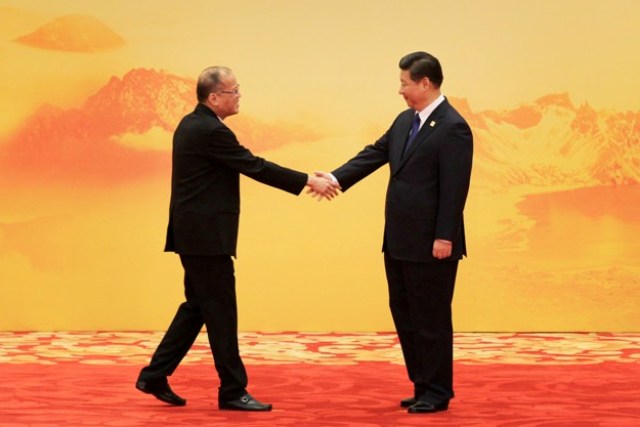Note: The territorial claims of China vs the Philippines, Myanmar, Vietnam, Malaysia, Taiwan including Japan over the corals and reefs in the are so wide and far apart that no settlement is currently possible. The claim of China is based on ancestral ownership and sovereignty while that of the Philippines and the other Asian nations is based on the UN Convention of the Law of the Sea (UNCLOS). Both claims are parallel to each other, that never shall the twain meet.US Says Philippines-China Negotiations Won't Work
Updated August 2, 2015In this Nov. 11, 2014 file photo, President Benigno Aquino III greets Chinese President Xi Jinping upon arrival for the 22nd APEC Leaders’ Meeting at the Hongyan Hall of the International Conference Center in Beijing, China. Malacañang Photo Bureau/Gil NarteaMANILA, Philippines — Bilateral negotiations may not be the best solution at the moment to settle the regional dustup over the South China Sea, the United States's top policy maker for East Asia and the Pacific said."I don't know anyone in the region who believes that a negotiated settlement between China and other claimants is attainable in the current atmosphere," Assistant State Secretary Daniel Russel said at a recent conference organized by Washington-based think tank The Center for Strategic and International Studies.China has long been insisting that it resumes bilateral talks with the Philippines and other claimants over the maritime dispute as it undertakes large-scale reclamation on contested sea features.The Philippines, meanwhile, is pursuing arbitration against China before a United Nations tribunal, which is currently deliberating on its jurisdiction over the case.Russel said that while the US does not take any position on the claims, it has called for either negotiations or arbitration as the two peaceful means to settle the competing claims.He admitted, however, that direct talks may not address the multiple competing claims by China, the Philippines, Myanmar, Malaysia, Taiwan and Vietnam.Also making negotiations difficult is an "absolutist political position taken by some claimants who insist that their own claims are 'indisputable' and represent territory—however distant from their shores," Russel said, without directly citing China.He said such claims include assertions that the territorial waters were "entrusted to them by ancestors" and vows never to relinquish "one inch."Reduced friction seen after arbitration rulingRussel also sees that if the arbitral tribunal finds it has jurisdiction under the United Nations Convention on the Law of the Sea (UNCLOS) over the Philippines' claims and proceeds deliberating on the merits of the case, its potential ruling can legally bind parties to the row.In this September 2013 file photo, Assistant Secretary of State for East Asian and Pacific Affairs Daniel Russel addresses international media in Tokyo after his meeting with Japan's chief cabinet secretary. State Dept/William Ng, fileHe explained that the tribunal may decide on whether China's nine-dash line claim is consistent with the UNCLOS or that the maritime features have their own exclusive economic zones and continental shelves.The ruling will address "the scope of the overlapping maritime claims – and hopefully the points of friction – would be significantly reduced," Russel said.Despite this, issues on sovereignty and boundary would remain unresolved, he said
Monday, August 3, 2015
US SAYS PHILIPPINES-CHINA NEGOTIATIONS WON'T WORK
Subscribe to:
Post Comments (Atom)


No comments:
Post a Comment